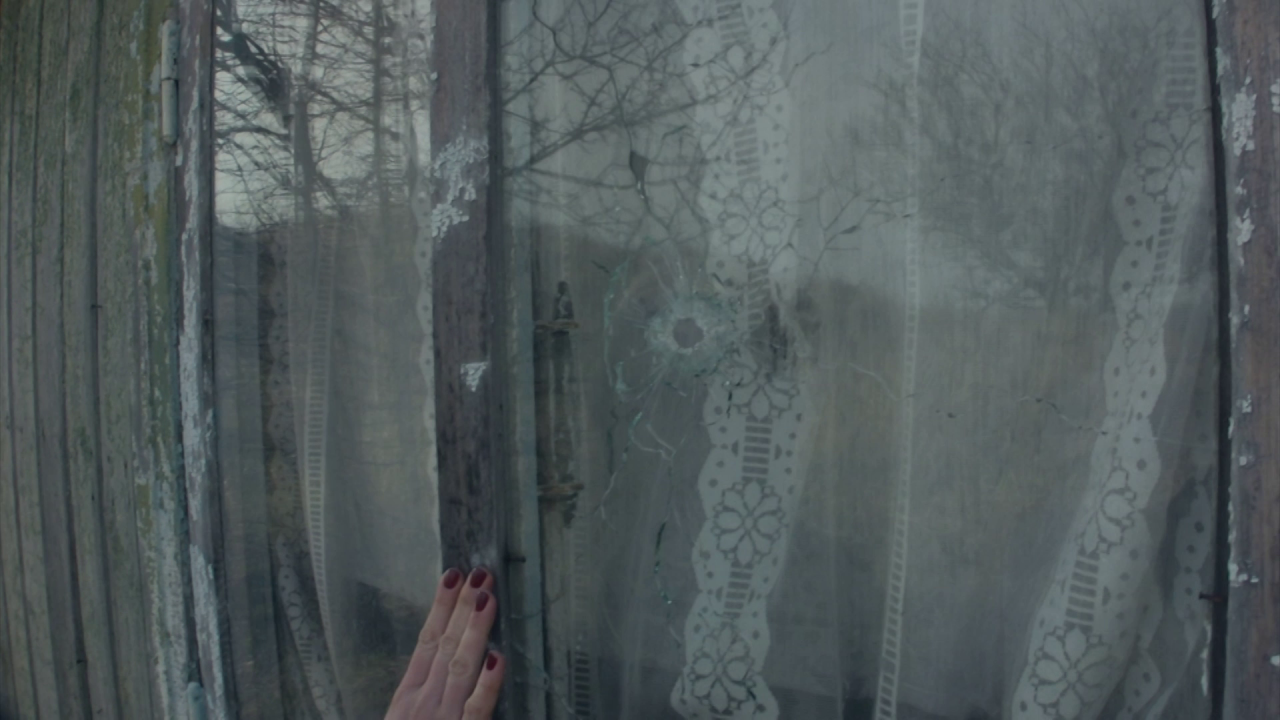This year, the film series Still Waters Run Deep, organized by Meno avilys and displayed under the Liubartas bridge, focuses on Ukrainian cinema and screenings of Ukrainian films selected by curators. One of them consists of the short films of Freefilmers, a collective of filmmakers from Mariupol. The collective’s work provides a unique opportunity to get to know Eastern Ukraine from the inside and reveals a different side of its identity, which is concurrent to political poetry, left-wing thought, and industrial landscapes.
Freefilmers themselves see their creative oeuvre as a political practice where the message is more important than the technical aspects of the film. Sashko Protyah, one of the members of the collective, says: ‘Freefilmers is also not only about filmmaking. It can be anything, comics, borscht, walking, cats, plants. I guess it’s about periphery and otherness and about an intersectional approach to resist the centre, the patriarchy, and the capital.’
This screening under the Liubartas bridge enables one to understand the spectrum of views and positions of contemporary Eastern Ukrainian culture and the young artist who represent it. The screening begins with a TV documentary, which will be followed by experimental films.
For more information, check Gerda Paliušytė‘s interview with Freefilmers: Sashko Protyah, Oksana Kazmina and Natasha Tzeliuba.

G.P. Dear Freefilmers, thank you for taking your time and for a chance to talk to you. First of all, how are you doing and where are you currently?
Natasha Tseliuba: It feels like people can manage with anything, even if it’s rocket attacks. Me either. I decided to stay in Ukraine because of many reasons. I currently live in Cherkasy.
Sashko Protyah: I’m based in Zaporizhzhia, as close as possible to my native city Mariupol, and it’s also a place where I feel there’s the right balance of being in relative safety and being able to work at full capacity.
Oksana Kazmina: I left to study in the US last autumn. I came back for the summer holidays around three weeks ago. I heard my first air raid siren in Lviv on the day I arrived. The next morning, I read the news about bombed shopping mall with around 2000 people inside in Kremenchuk. I celebrated my birthday in Morshyn. It was July 4th. There, at night, I heard an air raid siren, again (after a long break of about one week). Combined with soft classic music from the hotel’s corridor, it felt delusional. They were hitting Odesa and other cities that night/morning. I am in Lviv now, moving to Kyiv today. I am happy to leave Lviv, as the safety and comfort of this city make me nervous. It does not mean I enjoy danger, though.
G.P. What was the start of your collective? Did you all meet in Mariupol? Who initiated the movement, and what motivated it?
Natasha Tseliuba: Well, as a new member of the collective, I can’t say that Mariupol connects each of us. Especially since I am from Zaporizhzhya and I can’t even describe myself as a filmmaker, so for me being a part of the FF team is always about multi-support of each member with their creative ideas or any initiative case. Also, I feel that the team was motivated by special needs to find a new form and place (in any sense) in independent art instead of a capitalistic and institutionally protected film/art/festival scene.
Sashko Protyah: NGO Freefilmers was created as a political response to the cultural agenda which dominated Ukraine after 2014. That official agenda was like some type of Soviet Komsomol blah blah, only emerging from neoliberal politics. And we just wanted to stroll around industrial ruins and make films without deadlines:) This is how it all started. Industrial landscapes are still part of our identity, but we had to accept deadlines, too:) Mariupol was a perfect place to meet up first, but since then we have surely extended our horizons and our understanding of East Ukraine and East Europe. And we’ve drifted left, as we’ve been very observant and critical. Freefilmers is also not only about filmmaking. It can be anything, comics, borscht, walking, cats, plants. I guess it’s about periphery and otherness, and about an intersectional approach to resist the centre, the patriarchy, and the capital.
Oksana Kazmina: Some time ago, Sashko Protyah invited me to be part of the project CreativeEast. I worked as a videographer and editor for the two films, and then I became Freefilmers’ member. Or maybe in reversed order, or maybe simultaneously, it’s hard to say, it feels like I am a freefilmer from the moment I met Sashko, or visited Mariupol, or both.
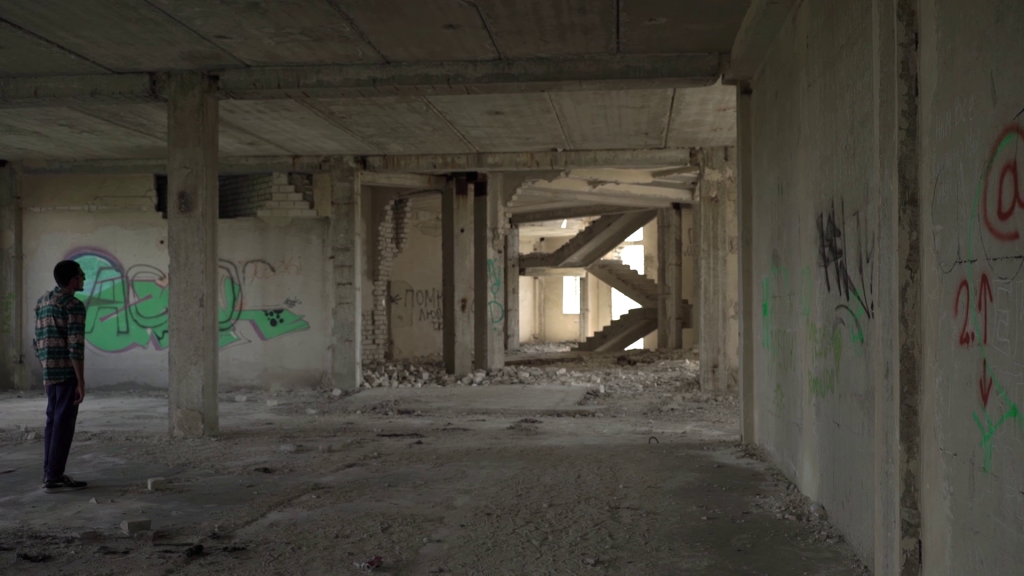
G.P. Can you expand a bit on how your leftist political views influence your creative processes in filmmaking? For example, the choice of genres and themes? It is interesting that your filmography is dense with different formats, from TV documentaries or music videos to experimental, low fi quality works or cinematic diaries.
Protyah: For me, political perspective is much more important than posh lenses and cameras. I’ve become a leftist filmmaker just because all these years I’ve been trying to understand what I see and who I talk to without any “aesthetic filters” and without imposing any ready-made explanations and concepts on my work. Filmmaking is about life and struggle, not about some red carpets and privileges. Also, I learned a lot from our viewers who helped to understand our films better, via discussions at film screenings. One of such audiences that influenced me a lot was the Emma social centre in Kaunas.
Tseliuba: Sure, first of all, my creative research usually started with a very basic and simple question to myself: why am I doing it and what I want to change. Globally I think every personal story (my top interest in filmmaking and contemporary art) has a political focal point. Our* two films were based on very important current questions of my life, and of course, when we start our film pre-research, whether it is a story about people who changed their countries or a story about my childhood in Cosmos district in Zaporizhzhya there are so many political/social/urban questions. The choice of genre was chosen intuitively, as a compromise between art and a “make or die” deal for me.
*Both films were created with co-director Yuliia Appen
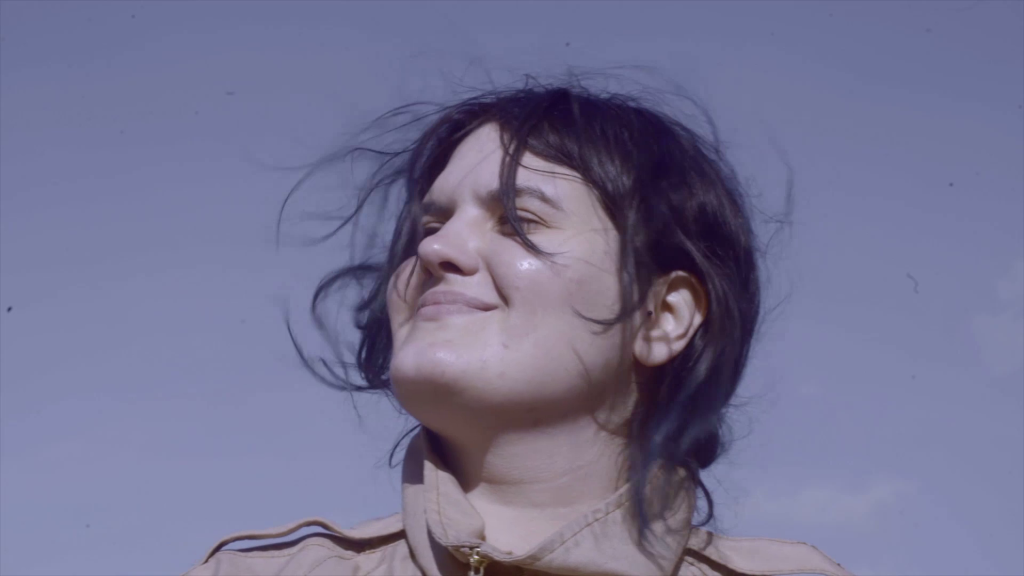
Oksana: I am not even sure if I am “left” as contemporary “left” has its context depending on geography and different political experiences, it’s not commonplace and needs to be revisited, in short, I am not sure I understand what “left” is now and am trying to figure out where I am on a political scale right now (definitely not on the right side though).
I am guided by my intuition and interests – I don’t usually make films about events/experiences I am not part of. In a way, all my works are about myself and/or about how I relate to others. I would also want to say that all my projects are collaborative and horizontal, but there is always only one place while shooting – in front or behind the camera, and mine is usually behind. Regarding technical tools – I stopped caring about the “quality” a while ago. The main thing for me is to understand what I want to say, and often this understanding develops while filming, and this process can not be too overloaded with logistics, technical issues, etc. I just can not pay too much attention to it. In this way, the “poor” image is often more “rich” and rewarding for me.
G.P. Sashko, could you tell us more about your experience in Kaunas? What was about the audience and its engagement that touched you?
It makes more sense to me when I screen my films outside the film industry context, that’s why I’ve always preferred to look for venues like community centres or squats or any non-commercial public places where people could talk about things like friends, more directly, without any statuses. So when I was travelling to Lithuania, I surfed the web and found Emma. I got in touch with them, and we organized a screening of Search, my video diary of Mariupol events in 2014–2015. Kaunas‘ audience’s comments helped me to feel more confident about political meanings in movies. I don’t want to become a director with some bullshit statuettes all over the living room. I want to be part of the political struggle for social and economic equality.
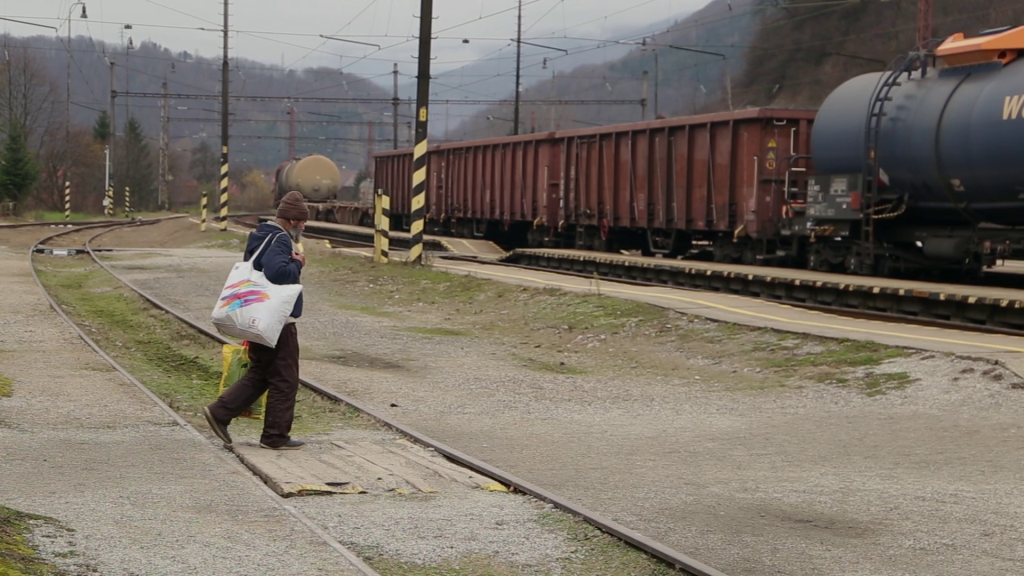
G.P. And Natasha, can you tell us more about the process of filmmaking in Zaporizhzhya? Did it change your relationship with the place?
Oh, of course! “My cosmos” was truly necessary for me because, on one hand, it was dedicated to my growing up, and on the other hand, it was a great way to compare my past perceptions and reality in my yard. Many times I had dreams about this district and even physically felt that I needed to feel again and share my story (let it be some kind of magic). Filming in Zaporizhzhya looks like a deep dive into people’s stories, and it always involves us in an urban mystery journey. At the end of our journey, I felt completely released and some relief from my childhood as self-therapy. I must have found my cure in that process.
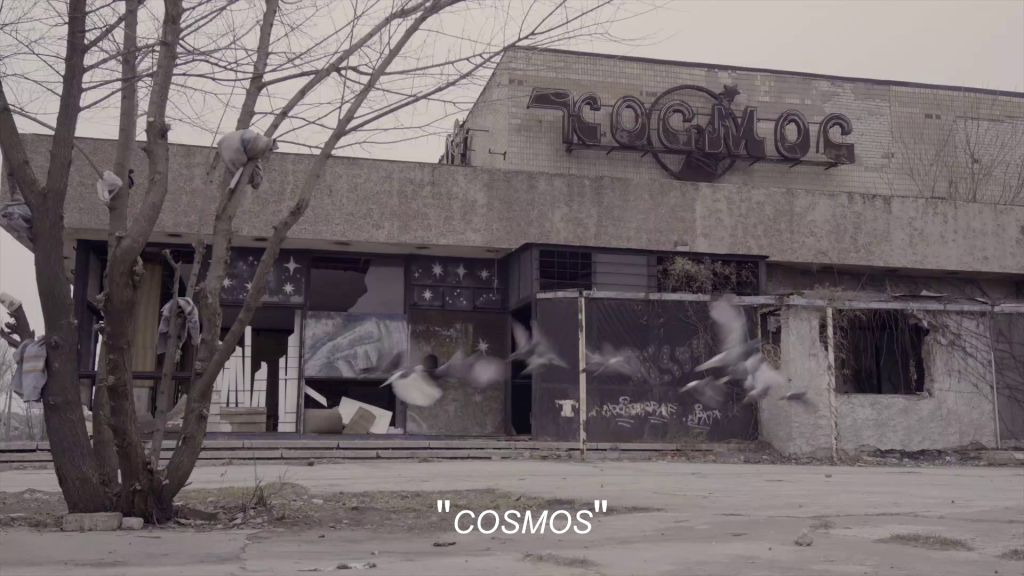
G.P. The industrial landscapes of Eastern Ukraine and their ambient sounds are often an important part of the ambience of your films. What is the role of sound in your life and your work?
Tseliuba: Sound and music is the thing that has followed me as far as I can remember. It always was in concerts, which I organized, in the audio sound library where I collected what I call radio surrealism, and of course in films. Sound is super important in my videos, and I fully agree with the most popular sentence that in film, audio is much more important than video.
Oksana: Sound is important to the extent it also allows silence. Silence and gaps are important, for we need time to stop, to look closer and, perhaps, to figure out some things (differently). In general, I like to play with the balance between presence (of video, sound) and its removal/omission.
It is different in some short conceptual videos, where sound (texts with music usually) is in the first place, and the image is there just for the sound/words to be heard more explicitly.
Protyah: Pictures, without voices, without direct speech of people and environments, turned out to be very unreliable as tools of understanding and tools of documenting as well. We could see how easily media and western intellectuals manipulate vulnerable contexts using just pictures and their fascination with them. Documenting sound and intonations could be even more important than Veni, vidi, vici! camerawork cos’ it’s less prone to manipulations. It’s more immersive, more resistant, and requires more contemplation.
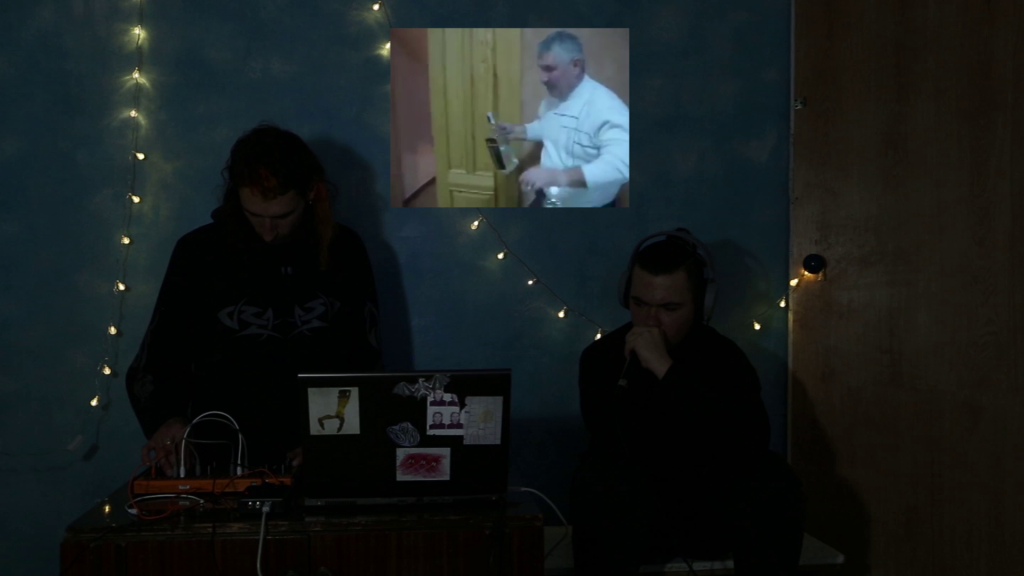
G. P. How do you see your work changing concerning Russia’s invasion and what is happening now in Ukraine? Do you have a chance/motivation to continue working in film?
Tseliuba: For now, I can’t find an answer about my future ideas in filming. I left some of the past scenarios now because I find them naive and not related to my current mood. In my case, film creation is often generated emotionally and spontaneously, and I can’t say what I will continue at this moment. Generally, now it is really hard to make any art.
Oksana: I left for the USA without my camera and did not feel I missed it there. Now, when I come back, I can not leave without my small backpack with the equipment inside. I am just archiving everything I find precious: under/overwatered plants my friends took care of while I was absent – still fighting and growing, mother’s garden, little signs, which remind me of where I am coming from – cinema in a living block in my district, graffiti, weed, people on the streets selling what they have planted and managed to take care of, my friends sharing their stories, my dog and cat, birds, rain. The meaning of this is to be found in the future.

Protyah: In March, we were desperate, and I believed it would be impossible for us to do any art projects for many months, if not years. Also, I was constantly approached by some western filmmakers with loads of awards and shit who just wanted me to fix for their film production. It was as if we were expected to produce some raw materials to allow western film industry capitalists to produce their high-tech masterpieces getting across our unique stories to the entire world. Many of them were truly annoying. They called without any messages in advance and asked to find someone in Mariupol who could share thought-provoking imagery with them. It was March when there was no internet in Mariupol, and people were in extreme danger to leave their shelters and basements, not to say that all of them would have preferred to use their last percents of phone battery power to send messages to their friends and families, and not some imagery to ambitious directors in safe locations. Anyway, by the end of May, we realised that we couldn’t live on without some artistic reflections, and in general, it was some basic need for us. We had to find strength to think about what we were going through. Vasyl Lyah started painting his huge canvases about the war. Oleksandr Surovtsov and Yulia Surovtsova created an experimental video about their experience in the besieged Mariupol. And I’ve also come back to making films. I’m filming a story about volunteer drivers who rescued people from Mariupol in March and April. And another story is about looting episodes in Mariupol at the beginning of March. In both videos, I guess the main focus is grassroots, almost anarchist cooperation vs. materialistic predatory reality.


